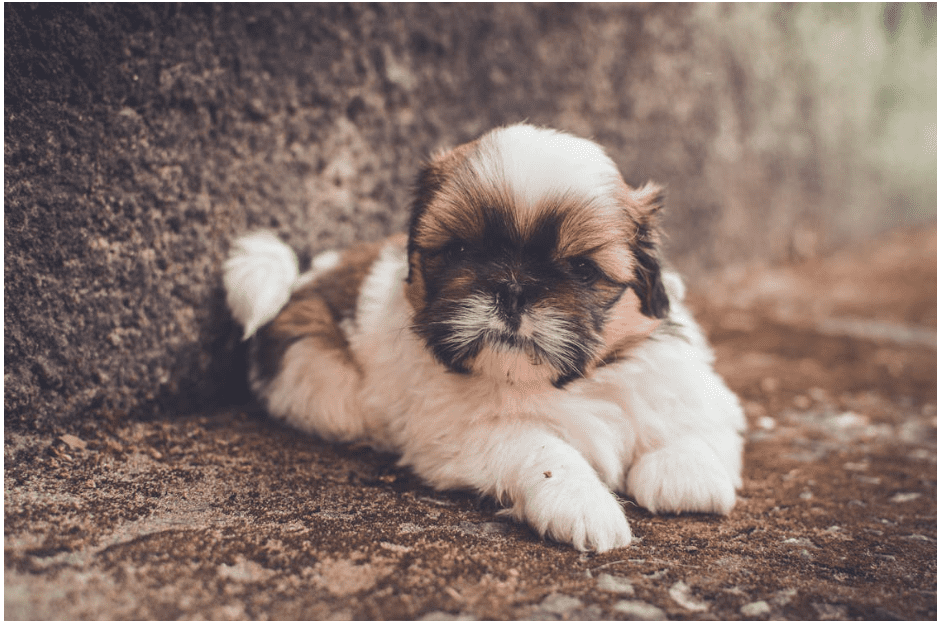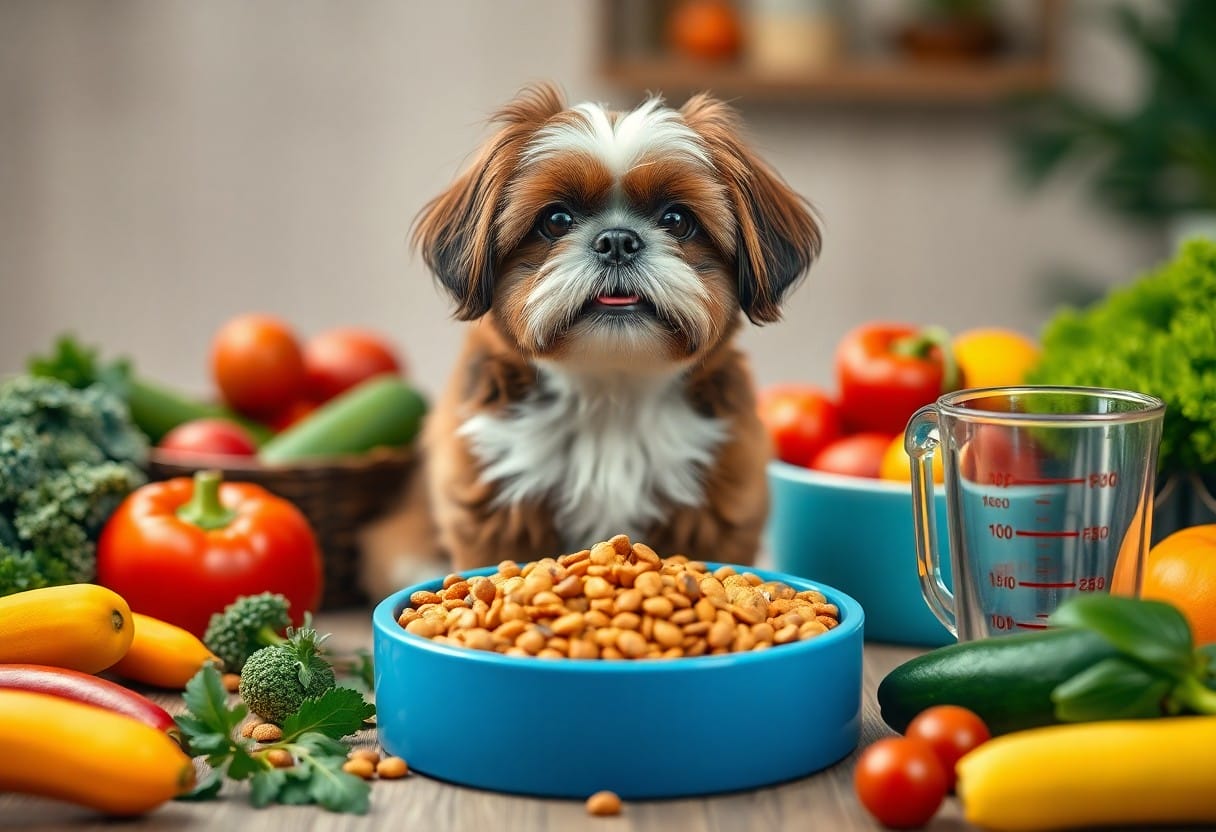
What Should You Feed a Shih Tzu? Nutrition Tips for Small Dogs
Share
You want to ensure your Shih Tzu thrives, and that starts with providing the right nutrition. These small dogs have unique dietary needs that require attention to high-quality ingredients and appropriate portion sizes. It's vital to choose a balanced diet that includes protein, healthy fats, and vital vitamins. Avoid ingredients that can be harmful, such as chocolate, grapes, and onions. By understanding the best foods for your Shih Tzu, you can promote a healthy weight and vibrant energy, contributing to their overall well-being.

Key Takeaways:
- High-quality protein: Choose dog foods that list a high-quality protein source as the first ingredient to support muscle health in your Shih Tzu.
- Portion control: Be mindful of portion sizes to prevent obesity, which is a common issue in Shih Tzus due to their small size and less active lifestyle.
- Balanced nutrition: Ensure the diet includes a mix of carbohydrates, healthy fats, vitamins, and minerals to promote overall health and energy levels.

Understanding Shih Tzu Nutritional Needs
To ensure your Shih Tzu maintains optimal health, it's important to understand their specific nutritional needs. As a small breed dog, the Shih Tzu has a unique metabolism that requires a balanced diet rich in imperative nutrients. This includes not only the right proportions of macronutrients like proteins, carbohydrates, and fats, but also vital vitamins and minerals. The right diet can help support your dog's energy levels, promote healthy digestion, and improve overall quality of life.
Meeting these nutritional requirements aids in preventing potential health issues. Small breeds are particularly susceptible to obesity, dental problems, and other conditions that can be exacerbated by improper diet. By choosing high-quality ingredients and appropriate portion sizes, you can manage your Shih Tzu's weight effectively, while also ensuring they receive all the necessary nutrients their smaller bodies demand.
Importance of Protein
Around 25 to 30% of your Shih Tzu's diet should consist of protein. Protein provides the building blocks for muscle mass, aids in tissue repair, and supports healthy immune function. When selecting food, opt for high-quality sources of protein such as chicken, turkey, or fish. These lean meats are easily digestible and offer imperative amino acids that are vital for your dog's growth and energy.
Additionally, protein plays a significant role in maintaining your dog's skin and coat health. A strong protein foundation in their diet will contribute to a shiny coat and reduce the risk of skin issues. Be cautious about protein sources; while some dog foods may contain low-quality fillers, ensure you choose options that prioritize whole meat ingredients.
Carbohydrates and Fiber
About 30 to 50% of your Shih Tzu's diet can come from carbohydrates. These nutrients are an imperative energy source, especially considering their active and playful nature. However, not all carbs are created equal; prioritize complex carbohydrates found in whole grains and vegetables over simple sugars or processed fillers. Foods such as brown rice and sweet potatoes provide sustained energy, helping your dog stay active and healthy.
Understanding the role of fiber in your dog's diet is equally important. Fiber aids in digestion, helps maintain a healthy weight, and keeps blood sugar levels stable. A fiber-rich diet can prevent constipation and promote overall gastrointestinal health. Foods like pumpkin, apples, and green beans are excellent sources of fiber that can be included in your Shih Tzu's diet. By incorporating these wholesome ingredients, you'll help ensure your dog's digestive system operates smoothly while also contributing to their overall well-being.

Choosing the Right Dog Food
Some dog owners may feel overwhelmed by the multitude of dog food options available on the market, especially when it comes to feeding a specific breed like the Shih Tzu. It's crucial to choose a product formulated for small breeds to meet their unique nutritional needs.
This will not only simplify your choices but also ensure that you are providing your furry friend with a balanced diet tailored to their size and energy requirements.
Dry vs. Wet Food
Between dry and wet dog food, each option has its benefits and drawbacks. Dry dog food, often referred to as kibble, is convenient, cost-effective, and helps maintain dental health by reducing tartar buildup. On the other hand, wet food is generally more palatable and can be beneficial for dogs with specific dietary needs, such as those with dental issues or finicky appetites. Ultimately, the decision may also hinge on your individual dog's preferences, and a combination of both can provide variety and make mealtime more enjoyable.
Quality Ingredients to Look For
Below are some indicators of high-quality dog food that you should consider when selecting the right nutrition for your Shih Tzu. Look for foods that list a specific protein source, such as chicken or fish, as the first ingredient, and avoid those with fillers like corn and soy, which offer minimal nutritional value. Additionally, foods enriched with crucial fatty acids, vitamins, and minerals are excellent for sustaining your dog's overall health. Pay special attention to the absence of artificial preservatives, colors, and flavors that can potentially harm your pet.
In fact, providing your Shih Tzu with quality ingredients can significantly enhance their energy levels and overall well-being. Focus on foods that contain whole fruits and vegetables, as these are valuable sources of crucial vitamins and antioxidants. It's also vital to check for no added sugar or harmful additives, which can lead to health issues, including obesity and allergies. Ensuring your dog follows a nutritious diet will promote not just a shiny coat and healthy skin, but also contribute positively to their long-term health.
Feeding Guidelines for Shih Tzus
Despite their adorable appearance, Shih Tzus require a carefully planned diet to maintain optimal health. These small dogs have specific nutritional needs, and it's imperative to provide them with balanced meals that cater to their age, weight, and activity level. You should always consult with your veterinarian to establish an individualized feeding regimen, ensuring your pet receives the right nutrients without unnecessary fillers. Pay attention to the quality of the dog food you choose; premium brands typically offer better ingredients and higher nutritional content, which is vital for your Shih Tzu's well-being.
Portion Control
Any dog owner knows that portion control is a fundamental aspect of feeding your Shih Tzu. Given their small size, it's easy to overestimate how much food your dog needs. Following the feeding guidelines provided on your dog food packaging and adjusting according to your pet's activity level will help prevent obesity—a common issue in small breeds. Keep in mind that a healthy Shih Tzu should maintain a trim body condition. A scale or body condition chart can assist you in monitoring your pet's weight, enabling you to adjust portion sizes as needed.
Frequency of Feeding
For optimal digestive health, you should establish a consistent feeding schedule for your Shih Tzu. Puppies usually require three to four meals a day, while adult dogs can be transitioned to two meals. This approach helps to regulate their metabolism and provides a steady energy supply throughout the day. It's imperative to measure out the food to prevent overeating and keep your dog from feeling hungry between meals.
Hence, consistency in meal times not only aids digestion but also helps you monitor any changes in your dog's appetite, which can indicate health issues. Skipping meals can lead to a host of potential health problems, such as gastrointestinal distress or more severe issues if prolonged. Be vigilant about your Shih Tzu's feeding routine, as this is key in nurturing a happy and healthy companion.
Homemade Diets for Shih Tzus
Now that you're considering a homemade diet for your Shih Tzu, it's imperative to ensure that you're providing balanced and nutritious meals tailored to their unique needs. With small dogs like Shih Tzus, portion control and ingredient selection are key. A homemade diet can offer fresh options and can often be more appealing than commercial dog food. That said, you must be selective about what goes into your dog's bowl, as some foods can harm their health.
Safe Ingredients to Use
One of the best ways to create a healthy homemade diet for your Shih Tzu is to focus on safe, nutritious ingredients. High-quality protein sources such as cooked chicken, turkey, and fish are excellent choices. Additionally, you can include cooked vegetables like carrots, peas, and broccoli. These ingredients not only add imperative vitamins and minerals to your dog's diet but also make meals more enjoyable. Whole grains like brown rice and quinoa can provide the necessary carbohydrates to fuel your dog's energy levels, making them great staples in a homemade diet.
Foods to Avoid
With pet care, it's just as important to know what to exclude from your dog's diet as it is to know what to include. Certain foods can be toxic or detrimental to your Shih Tzu's health. Common foods like chocolate, grapes, raisins, onions, and garlic should be strictly off-limits. These ingredients can cause serious health issues, ranging from gastrointestinal distress to organ failure. It's vital that you educate yourself about other harmful items such as avocados, macadamia nuts, and any food containing xylitol, a sweetener highly toxic to dogs.
Avoid giving your Shih Tzu table scraps or any food not specifically prepared for pets, as human food can often lead to obesity and other health problems. Some ingredients that seem harmless can quickly become dangerous if consumed by your dog. Always consult your veterinarian for a complete list of foods that should be avoided to ensure your furry friend's safety and well-being.
Common Nutritional Myths
Not all advice you hear about dog nutrition is accurate. For instance, many pet owners believe that dogs can thrive solely on a grain-free diet; however, this isn't necessarily true for every breed, including Shih Tzus. It's important to recognize that grains can be a beneficial source of carbohydrates, fiber, and crucial nutrients for many dogs.
Misunderstanding these dietary needs can lead to imbalances in your dog's nutrition, so it's vital to question the source of your information and consult professionals when in doubt.
Grain-Free Diets
Behind the trend of grain-free diets lies a growing belief that grains contribute to food allergies in dogs. While it's true that some dogs may have specific allergies to grains, this is not the case for all dogs. In fact, a balanced diet that includes grains can offer crucial nutrients and energy. Instead of eliminating grains entirely, focus on identifying what works best for your individual dog, as every pet is unique in their dietary requirements.
Raw Food Diet
Along with the appeal of a raw food diet—rich in real, unprocessed ingredients—lies the potential for nutritional imbalances and health risks. While this diet can theoretically offer benefits in terms of improved coat condition and energy levels, it can also expose your Shih Tzu to harmful bacteria and parasites if not prepared and handled correctly. It's important to ensure that any raw diet you consider is nutritionally complete and balanced.
Common concerns with raw food diets include the risk of bacterial contamination from improper handling and nutritional imbalance due to lack of crucial vitamins and minerals. While some owners have reported
positive results such as improved appetite and digestion, it's crucial to consult your veterinarian before transitioning to this type of diet to ensure you're supporting your Shih Tzu's health rather than compromising it.
Signs of Nutritional Deficiencies
Physical Indicators
Between the various signs of nutritional deficiencies, you may first notice some physical indicators in your Shih Tzu. Common issues include a dull, lifeless coat, which can often suggest a lack of crucial fatty acids or important vitamins that promote healthy fur. Furthermore, if your dog is experiencing unexpected weight loss or gain, it could indicate an imbalance in their diet. Pay close attention to their skin as well; redness, itchiness, or excessive flakiness may point to poor nutrition that fails to nourish their body properly.
Behavioral Changes
On a behavioral level, nutritional deficiencies can manifest in several ways. You might observe your Shih Tzu becoming increasingly lethargic or disengaged, making it apparent that they are lacking the necessary energy from their food sources. Additionally, you may find them exhibiting sudden changes in appetite – either eating less than usual or, conversely, showing signs of increased hunger that can indicate nutrient malabsorption. These alterations can be distressing not only for your pet but also for you as their caregiver.
Nutritional needs are not just about what your Shih Tzu eats; they also play a significant role in their overall mood and demeanor. A dog lacking the right nutrients may become irritable or anxious, leading to increased barking or destructive behavior. It's vital to take notice of these changes and evaluate your dog's diet accordingly, ensuring it is well-balanced and adapted to their specific needs. Proper nutrition not only supports the physical health of your Shih Tzu but also contributes to their overall happiness and well-being.
Final Words
Now that you have a better understanding of what to feed your Shih Tzu, it's imperative to focus on providing a balanced diet that supports their health and vitality. Look for high-quality dog food specifically formulated for small breeds, as this will offer the right balance of protein, carbohydrates, and fats. Always check the ingredient list to ensure that meat is the primary ingredient and avoid food with excessive fillers or artificial additives. Portion control is also important; overfeeding can lead to obesity, which is especially common in small breeds like Shih Tzus.
Additionally, consider incorporating fresh fruits and vegetables into your dog's diet as healthy treats or supplements. Foods like carrots, blueberries, and sweet potatoes can provide added vitamins and minerals. Always introduce new foods gradually, monitoring for any adverse reactions. Ultimately, your Shih Tzu's nutrition should be tailored to their individual needs, weight, and activity level. By maintaining a well-rounded diet and consulting with your veterinarian, you can ensure your furry friend enjoys a long, healthy life filled with energy and happiness.
Frequently Asked Questions
What is the best type of food for a Shih Tzu?
A: The best type of food for a Shih Tzu is high-quality dog food formulated specifically for small breeds. Look for options that list meat as the first ingredient and contain a balance of protein, fats, and carbohydrates. Both dry kibble and wet food can be suitable, but dry kibble can also help reduce dental plaque.
How often should I feed my Shih Tzu?
A: Adult Shih Tzus should be fed two meals a day, while puppies may require three to four smaller meals throughout the day. It can be beneficial to establish a consistent feeding schedule to help manage their energy levels and maintain a healthy weight.
Are there any human foods that are safe for Shih Tzus?
A: Yes, certain human foods can be safe and healthy for Shih Tzus. Safe options include cooked lean meats, certain fruits like apples and blueberries, and vegetables like carrots and sweet potatoes. Always avoid foods that are toxic to dogs, such as chocolate, grapes, onions, and garlic.
How can I tell if my Shih Tzu is getting the right nutrition?
A: Signs that your Shih Tzu is getting the right nutrition include a shiny coat, clear eyes, good energy levels, and a healthy weight. Regular vet check-ups can help monitor their health and ensure that they are receiving proper nutrition. If you notice any changes in appetite, weight, or behavior, consult your veterinarian.
What should I do if my Shih Tzu is a picky eater?
A: If your Shih Tzu is a picky eater, you can try different brands or flavors of dog food to find one that they enjoy. Mixing in a small amount of wet food or adding a little warm water to dry kibble can also enhance the aroma and appeal. Gradually introducing new foods and maintaining a consistent feeding routine may help encourage better eating habits.
